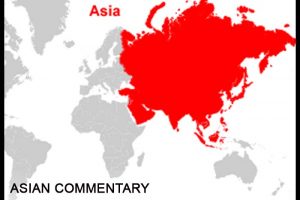Asian Markets A Sea Of Red On US Inflation Data

Asian stock markets are in a sea of red on Wednesday, following the broadly negative cues from global markets overnight, after hotter-than-expected U.S. inflation data raised concerns the Fed will even more aggressively hike interest rate at its upcoming policy meeting next week and triggered heavy selling at several counters from across various sectors. Asian Markets closed mostly higher on Tuesday.
The U.S. consumer inflation rose unexpectedly in the month of August, supporting expectations that the Federal Reserve will stick with a 75 basis-point rate hike this month. The report showed an unexpected monthly uptick in consumer prices as well as a smaller than expected slowdown in the annual rate of price growth.
Paul Ashworth, Chief U.S. Economist at Capital Economics, said there might be some late speculation that the Fed could even go for a 100bp hike although, with rates now close to neutral, we doubt that will happen.
CME Group’s FedWatch Tool is currently indicating a 68.0 percent chance of a 75 basis point rate hike and a 32.0 percent chance of a 100 basis point rate hike.
The Australian stock market is sharply lower on Wednesday, giving up most of the gains in the previous four sessions, with the benchmark S&P/ASX 200 falling nearly 200 points to the 6,800 level, following the sell-off in the global markets overnight, with weakness across all sectors as after hotter-than-expected U.S. inflation data raised concerns the Fed will even more aggressively hike interest rate at its upcoming policy meeting next week.
The benchmark S&P/ASX 200 Index is losing 169.60 points or 2.42 percent to 6,840.10, after hitting a low of 6,808.60 earlier. The broader All Ordinaries Index is down 171.60 points or 2.37 percent to 7,082.10. Australian stocks ended significantly higher on Tuesday.
Among major miners, BHP Group is losing more than 2 percent and Fortescue Metals is slipping almost 4 percent, while Rio Tinto, OZ Minerals and Mineral Resources are declining almost 3 percent each.
Oil stocks are lower. Santos and Beach energy are losing more than 1 percent each, while Origin Energy is declining more than 2 percent and Woodside Energy is slipping almost 2 percent.
In the tech space, Afterpay owner Block, Xero and Zip are sliding almost 6 percent each, while WiseTech Global is losing more than 4 percent and Appen is down almost 3 percent.
Among the big four banks, ANZ Banking, and Westpac are losing more than 2 percent each, while National Australia Bank and Commonwealth Bank are slipping more than 3 percent each.
Among gold miners, Resolute Mining and Northern Star Resources are sliding more than 5 percent each, while Gold Road Resources is slipping almost 6 percent, Newcrest Mining is losing more than 3 percent and Evolution Mining is plunging more than 6 percent.
In the currency market, the Aussie dollar is trading at $0.673 on Wednesday.
The Japanese stock market is tumbling on Wednesday, giving up most of the gains in the previous four sessions, with the Nikkei 225 falling more than 600 points to below the 28,000 mark, following the broadly negative cues from global markets overnight, with weakness across all sectors as after hotter-than-expected U.S. inflation data raised concerns the Fed will even more aggressively hike interest rate at its upcoming policy meeting next week.
The benchmark Nikkei 225 Index closed the morning session at 27,991.82, down 622.81 points or 2.18 percent, after hitting a low of 27,795.64 earlier. Japanese stocks closed modestly higher on Tuesday.
Market heavyweight SoftBank Group is losing almost 4 percent and Uniqlo operator Fast Retailing is down almost 3 percent. Among automakers, Honda is edging down 0.4 percent and Toyota is losing almost 1 percent.
In the tech space, Screen Holdings is losing more than 2 percent, Advantest is declining almost 4 percent and Tokyo Electron is down more than 3 percent.
In the banking sector, Mizuho Financial is flat, while Mitsubishi UFJ Financial and Sumitomo Mitsui Financial are edging down 0.4 percent each.
Among the major exporters, Sony is slipping more than 3 percent and Canon is edging down 0.4 percent, while Panasonic and Mitsubishi Electric are losing more than 2 percent each.
Among the other major losers, Keyence is plunging almost 5 percent and Omron is losing more than 4 percent, while Recruit Holdings, TDK, Pacific Metals, NEXON, Ebara, Fanuc and Sumitomo Metal Mining are declining almost 4 percent each. Trend Micro and Minebea Mitsumi are down more than 3 percent each.
Conversely, there are no major gainers.
In the currency market, the U.S. dollar is trading in the mid-144 yen-range on Wednesday.
Elsewhere in Asia, Hong Kong is slipping 2.5 percent, while New Zealand, South Korea, Singapore and Taiwan are lower by between 1.1 and 1.6 percent each. China, Malaysia and Indonesia are down by between 0.5 and 0.7 percent each.
On Wall Street, stocks moved sharply lower over the course of the trading session on Tuesday, largely offsetting the recent recovery rally. The major averages all showed substantial moves to the downside, snapping a four-session winning streak.
The major averages climbed off their worst levels going into the close but still posted steep losses on the day. The Dow plunged 1,276.37 points or 3.9 percent to 31,104.97, the Nasdaq dove 632.84 points or 5.2 percent to 11,633.57 and the S&P 500 plummeted 177.72 points or 4.3 percent to 3,932.69.
The major European markets also moved sharply lower following the U.S. inflation report. While the U.K.’s FTSE 100 Index slumped 1.2 percent, the French CAC 40 Index tumbled by 1.4 and the German DAX Index dove by 1.6 percent.
Crude oil futures snapped a three-session winning streak and ended lower on Tuesday after higher-than-expected U.S. inflation data raised concerns the Fed will aggressively hike interest rate. West Texas Intermediate Crude oil futures for October ended lower by $0.47 or about o.5% at $87.31 a barrel, coming off a high of $89.31 a barrel.
Source: Read Full Article
